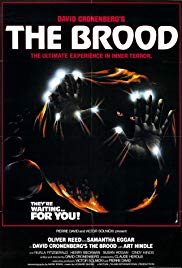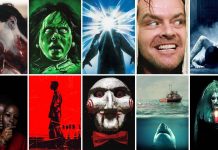Welcome to HouseOfHorrors.com, the most extensive Horror Movie Collection on earth and the favorite destination for millions of our horror genre fans for more than 20 years. In this article, you will find The Brood Review, Rating, and Synopsis. The Brood is a 1979 English Horror movie directed by David Cronenberg. We hope you will be able to find this The Brood Review article useful. In case you have any comments, please feel free to share with us.
The Brood (1979) Rating:
- Dylan = 9 / 10;
- Eloise = 7 / 10;
- Raoul = 7 / 10;
- IMDb = 6.9 / 10;
- Rotten Tomatoes = 8 / 10
The Brood (1979) Synopsis:
A strange therapist seems to be at the origin of a series of nasty murders and other strange events.
The Brood (1979) Review:
It’s finally here. David Cronenberg’s 1979 film The Brood is one of the best films in this director’s filmography, easily his first mature and polished work following Shivers (1975) and Rabid (1977). The Brood is one of Mr. Cronenberg’s most accomplished works, a film that he has reportedly described as his version of Kramer vs. Kramer (1979) following an acrimonious (to say the least) divorce. In the United States, The Brood has never really been represented well on home video, certainly not given the respect it deserves while other far lesser films have been lavished with extensive special editions in multiple DVD and Blu-ray outings.
The incomparable Oliver Reed stars as Hal Raglan, a psychiatrist and Head of the Somafree Institute of Psychoplasmics, which is a new method of treating patients by getting them to sublimate their repressed emotions through physiological alterations to their bodies (one character has growths all over his body which is the rage he suppressed against his father). One of his patients, Nola Carveth (Samantha Eggar), is in the midst of a custody battle with her husband Frank Carveth (Art Hindle) over their daughter Candy (Cindy Hinds) who only recently showed signs of domestic abuse.
Frank believes that Nola beat Candy during her weekend visits with mom at the institute which Frank is not privy to. Unbeknownst to Frank, Raglan has Nola in deep therapy, and her bouts of rage concerning the abuse she suffered at the hands of her own mother cause her to give birth to asexual children who attack the people she wills them to kill. In a shocking scene, Nola wills her brood (hence the title) to attack Candy’s kindergarten teacher after finding out that she babysat Candy and assuming she had an affair with Frank. We come to learn that Nola was abused by her mother Juliana, which explains why the brood attacks her - tragically, Candy is a witness to this.
Ms. Hinds, who also appeared in Mr. Cronenberg’s The Dead Zone(1983), portrays Candy as an almost emotionless girl who is trying to understand and take in everything that she sees, both the good and the bad. All of the anger and resentment that Nola feels culminates in a rather violent ending which pits Raglan against the brood as he struggles to save Candy. The ending has been deemed depressing, but it successfully sends the message that children are affected by divorce in more ways than one.
The film does an expert job of presenting a believable cast of characters who are at odds with one another. The subject matter is not pleasant, but then again neither are divorces. One can only imagine the acrimony the director experienced with his own wife as he sublimated his own anger of trying to gain custody of his daughter into this film. This was also the first time that Mr. Cronenberg got truly A-list actors.
They had previously shared the screen together in The Lady in the Car with Glasses and a Gun (1970). Here, their dynamic is infinitely more intense. Art Hindle is convincing as a torn father/husband trying to protect his daughter. Genre fans will remember him as Lynne Griffin’s boyfriend in Bob Clark’s Black Christmas (1974), Dr. Howell in Invasion of the Body Snatchers (1979), and as Dirk Winfield in Into the Fire(1988). Robert Silverman does a nice turn as Jan Hartog. He went on to play the janitor in Prom Night (1980) and also worked for Mr. Cronenberg on four other films. Gary Sheehan, who is very effective as Mike, also appeared in Rabid(1976).
Birth Pains (31:05) - a thoroughly enjoyable look at what went on during the making of The Brood as it went into production during the late fall of 1978. Interviewed are Samantha Eggar, Rick Baker, Joe Blasco, Mark Irwin, Pierre David, and John Board.
Meet the Carveths (19:49) - a cleverly-titled 2013 piece that returns Art Hindle and Cindy Hinds to the school where the brood kidnapped Candy. Emceed by Fangoria’s former editor Chris Alexander, what is most interesting is hearing the mention of other roles that Ms. Hinds had, especially Deadline (1984), one of those video nasties that was released on several video labels; she later left acting. I would have loved to have seen interviews with the members of the girls’ gymnastics team that played the brood. They felt about some of the most violent parts of the film.
Merv Griffin (20:50) - Oliver Reed appears on Merv Griffin’s talk show along with Orson Welles and Charo of all people.
Crimes of the Future (70:00) - this early Cronenberg feature from 1970, which has been available on the Criterion Collection’s Dead Ringers laserdisc and Blue Underground’s Fast Company DVD and Blu-ray, appears here in a much-improved transfer. It would have been nice to also see the inclusion of Mr. Cronenberg’s Transfer (1966), From the Drain (1967), and Stereo (1969). Hopefully, one day we will have all of his shorts and television work in one collection.
Cronenberg: The Early Years (13:18) - this a 2011 interview that the director did with Fangoria’s former editor Chris Alexander wherein he discusses how he came to be a filmmaker thanks to the folks at Cinepix in Canada, specifically John Dunning and Andre Link
Also, Read:








